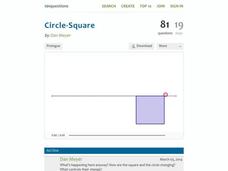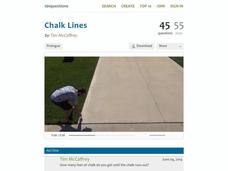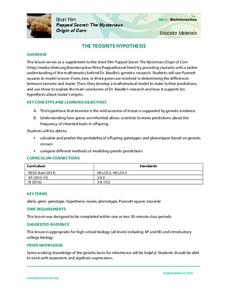101 Questions
Pool Bounce
Use geometry to improve your pool game! Learners analyze the front half of a pool shot to determine its resulting path. By measuring the angle of incidence, they are able to predict the path of the ball.
101 Questions
Super Stairs
Keep your classes climbing in the right direction. Young mathematicians collect data from a video presentation. Using their data, they build an arithmetic sequence and use it to make predictions.
101 Questions
Apple Mothership
Explore Apple's spaceship office building. Built in the shape of a circle, the office building offers a unique floor plan challenge. Young scholars use the dimensions of the building to estimate the square footage for each employee.
101 Questions
Bottomless Mug
How much coffee can you actually drink? An intriguing lesson has learners consider an advertisement for a bottomless mug of coffee. While considering the price of the mug, they analyze different scenarios to determine the cost-saving...
101 Questions
Circle-Square
How do the area and perimeters of circles and squares compare? A clever video illustrates the change in the area of a circle and square while their total perimeter stays the same. The task is for learners to predict the point where the...
101 Questions
Chalk Lines
Read between the lines to find a solution. Budding mathematicians analyze a situation to solve a problem. They view a video presentation of the problem, brainstorm important information to gather, and write linear equations to find...
101 Questions
Pixel Pattern
Any vintage video game users in the room? Young scholars use a video presentation to analyze patterns in pixel arrangements. By writing an arithmetic sequence, they make predictions about the size of the image.
101 Questions
Best Circle
Drawing the perfect circle is harder than one would think! What makes a circle a circle and how can you define that with a formula? Young mathematicians devise their own methods of analyzing the imperfections of circle drawings. Using...
101 Questions
Best Triangle
What makes an equilateral triangle equilateral? It turns out it's much more than just the side lengths! Learners analyze four different triangles to determine the best equilateral triangle. They create a formula that they later use to...
National Nanotechnology Infrastructure Network
Help or Hype: The Ethics of Bio-Nanotechnology
Ethical concerns are not always black and white. A well-designed lesson presents learners with scenarios for which ethics may come into question. Scholars learn to consider the different sides of a situation and make an unbiased conclusion.
Howard Hughes Medical Institute
Lesson 7: Observations Across Habitats
How are animals in separate but nearby habitats related? Ecology scholars compare the animal inhabitants of the Gorongosa National Park in part seven of an eight-part series. Learners study photos from two different habitats, then...
Howard Hughes Medical Institute
The Teosinte Hypothesis
Don't want to sound corny, but your class will be a-maize-d by an engaging activity! Explore the history of the modern corn plant through a video and Punnett squares. Junior genetics experts get hands-on experience with actual research...
Howard Hughes Medical Institute
Building Ecological Pyramids
Looking for a fresh take on traditional food/energy pyramids? Conduct an innovative activity where pupils build their own! The lesson uses research data from Gorongosa National Park in Mozambique for a real-life safari touch. Scholars...
Howard Hughes Medical Institute
Niche Partitioning Activity
Dinnertime on the African savanna is a highly choreographed event! Introduce young ecologists to the concept of niche partitioning through a hands-on activity. Pupils research animal behaviors and use data to develop an understanding of...
The New York Times
I Don’t Think So: Writing Effective Counterarguments
When it comes to writing effective arguments, writers must do more than simply make a claim, counterarguments must be considered. Aspiring writers analyze counterarguments in editorials, and then learn how to write counterarguments in...
101 Questions
Meatballs
Your classroom will overflow with learning as they analyze the volume in a pot of meatballs. Young mathematicians predict the number of meatballs that will make a pot of sauce overflow. They incorporate both the volume of cylinders and...
101 Questions
Hot Coffee
Your classes will be wide awake during a piping hot lesson! Introduce the resource with a video of the world-record-breaking cup of coffee. Learners work to determine the volume of the cup of coffee to predict if it will break the record.
Howard Hughes Medical Institute
Seed Dispersal in Tropical Forests
How do seeds get around? It's not like plants can control seed dispersal—or can they? Dig deeper into the amazing mechanisms of seed dispersal observed in tropical plants through interactives, a video, and plenty of hands-on data...
Chemistry Collective
Virtual Lab: DNA - Dye Binding: Equilibrium and Buffer Solutions
Your class is bound to be fascinated by this virtual lab! Young biochemists explore molecules that bind to specific sites on the DNA molecule through a skillful simulation. The lesson challenges learners to create a DNA-bound solution...
Chemistry Collective
Virtual Lab: Creating a Buffer Solution
Buffers don't just magically appear in the stockroom when you need them! Give learners a crash course in buffer basics using an interactive lab assignment. Individuals are tasked with creating a buffer with a certain pH that will react...
Chemistry Collective
Virtual Lab: Unknown Acid and Base Problem
Looking for an easy way to give your class experience with acid-base chemistry outside the lab? Try a detailed interactive that puts them in total control! Young chemists determine the dissociation constant and concentration of an...
Chemistry Collective
Virtual Lab: Determining the pKa and Concentration Ratio of a Protein in Solution
It's pretty common to determine the dissociation constant for an acid or a base ... but, what about a protein? Challenge your class with a virtual lab designed to further develop their acid-base chemistry skills. Individuals determine...
Chemistry Collective
Virtual Lab: Strong Acid and Base Problems
Strong acids and bases don't hesitate to dissociate! Your chemistry class won't hesitate calculating pH either, thanks to an engaging simulation. Individuals perform a series of pH determinations on paper, then use the virtual lab to...
Chemistry Collective
Virtual Lab: DNA Binding Problem
Why do the bases in DNA pair up the way they do? Unravel the mystery of the double helix in a virtual lab. Young scientists follow in the footsteps of Watson and Crick to determine the free energy associated with DNA base pair binding....

























